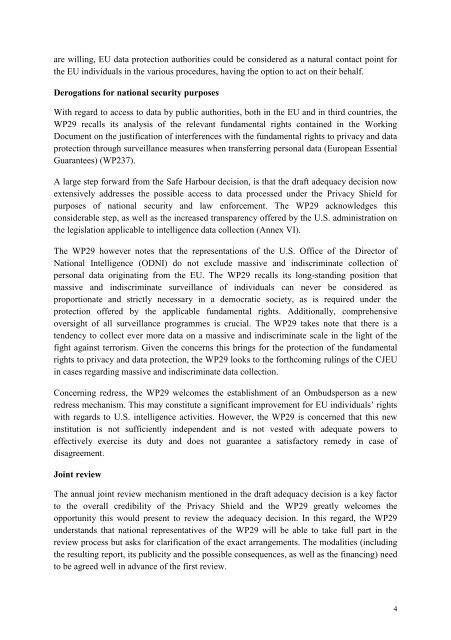ARTICLE 29 DATA PROTECTION WORKING PARTY
1SANK0H
1SANK0H
You also want an ePaper? Increase the reach of your titles
YUMPU automatically turns print PDFs into web optimized ePapers that Google loves.
are willing, EU data protection authorities could be considered as a natural contact point for<br />
the EU individuals in the various procedures, having the option to act on their behalf.<br />
Derogations for national security purposes<br />
With regard to access to data by public authorities, both in the EU and in third countries, the<br />
WP<strong>29</strong> recalls its analysis of the relevant fundamental rights contained in the Working<br />
Document on the justification of interferences with the fundamental rights to privacy and data<br />
protection through surveillance measures when transferring personal data (European Essential<br />
Guarantees) (WP237).<br />
A large step forward from the Safe Harbour decision, is that the draft adequacy decision now<br />
extensively addresses the possible access to data processed under the Privacy Shield for<br />
purposes of national security and law enforcement. The WP<strong>29</strong> acknowledges this<br />
considerable step, as well as the increased transparency offered by the U.S. administration on<br />
the legislation applicable to intelligence data collection (Annex VI).<br />
The WP<strong>29</strong> however notes that the representations of the U.S. Office of the Director of<br />
National Intelligence (ODNI) do not exclude massive and indiscriminate collection of<br />
personal data originating from the EU. The WP<strong>29</strong> recalls its long-standing position that<br />
massive and indiscriminate surveillance of individuals can never be considered as<br />
proportionate and strictly necessary in a democratic society, as is required under the<br />
protection offered by the applicable fundamental rights. Additionally, comprehensive<br />
oversight of all surveillance programmes is crucial. The WP<strong>29</strong> takes note that there is a<br />
tendency to collect ever more data on a massive and indiscriminate scale in the light of the<br />
fight against terrorism. Given the concerns this brings for the protection of the fundamental<br />
rights to privacy and data protection, the WP<strong>29</strong> looks to the forthcoming rulings of the CJEU<br />
in cases regarding massive and indiscriminate data collection.<br />
Concerning redress, the WP<strong>29</strong> welcomes the establishment of an Ombudsperson as a new<br />
redress mechanism. This may constitute a significant improvement for EU individuals’ rights<br />
with regards to U.S. intelligence activities. However, the WP<strong>29</strong> is concerned that this new<br />
institution is not sufficiently independent and is not vested with adequate powers to<br />
effectively exercise its duty and does not guarantee a satisfactory remedy in case of<br />
disagreement.<br />
Joint review<br />
The annual joint review mechanism mentioned in the draft adequacy decision is a key factor<br />
to the overall credibility of the Privacy Shield and the WP<strong>29</strong> greatly welcomes the<br />
opportunity this would present to review the adequacy decision. In this regard, the WP<strong>29</strong><br />
understands that national representatives of the WP<strong>29</strong> will be able to take full part in the<br />
review process but asks for clarification of the exact arrangements. The modalities (including<br />
the resulting report, its publicity and the possible consequences, as well as the financing) need<br />
to be agreed well in advance of the first review.<br />
4


